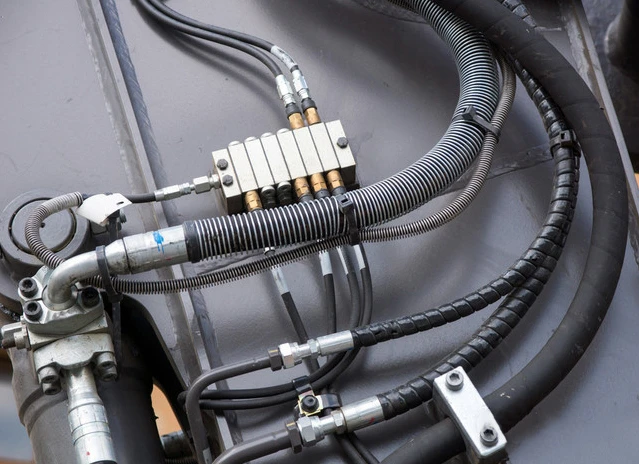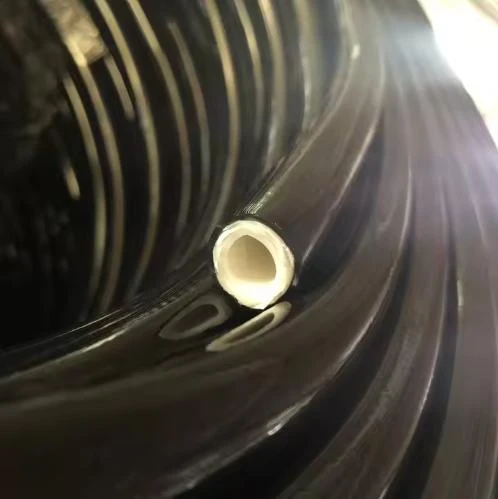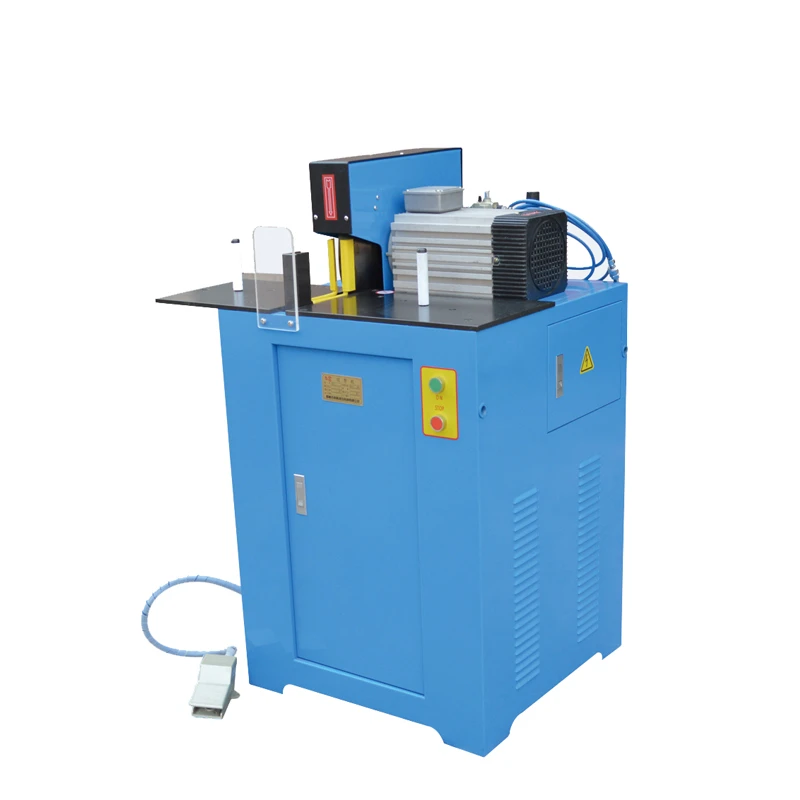Manguera química
Una manguera química es un tipo de manguera diseñada específicamente para transportar de forma segura una amplia gama de productos químicos, como ácidos, álcalis, disolventes, aceites y otros líquidos peligrosos o agresivos. Estas mangueras están fabricadas con materiales resistentes a la corrosión, los ataques químicos y la abrasión para garantizar un funcionamiento seguro y eficaz. El revestimiento interior de una manguera química suele estar hecho de caucho sintético, PTFE (teflón) u otros compuestos especializados que proporcionan una alta resistencia a diversos productos químicos. La cubierta exterior suele estar reforzada con alambre de acero trenzado o capas textiles para aumentar su resistencia y proteger contra daños mecánicos. Las mangueras químicas se utilizan en numerosas industrias, como la fabricación de productos químicos, la farmacéutica, la agricultura, el petróleo y el gas, y la producción de alimentos, donde se requiere la transferencia de materiales peligrosos o altamente reactivos. Por ejemplo, en la industria química, estas mangueras se utilizan para transferir productos químicos industriales entre tanques y equipos de procesamiento, mientras que en la agricultura se utilizan para pulverizar pesticidas y fertilizantes. Las mangueras químicas también se utilizan para transportar combustible y lubricantes en la industria del petróleo y el gas. Su capacidad para resistir la degradación química, la presión y las altas temperaturas los hace indispensables en aplicaciones donde la seguridad y la confiabilidad son primordiales.
¿Qué factores deben tenerse en cuenta al seleccionar una manguera química?
Al seleccionar una manguera química, es fundamental considerar varios factores clave para garantizar que sea adecuada para la aplicación específica. El primer factor a evaluar es la compatibilidad del material de la manguera con los productos químicos que se transportan. Diferentes productos químicos pueden causar distintos niveles de degradación en los materiales de las mangueras, por lo que es crucial elegir una manguera resistente a los productos químicos fabricada con materiales resistentes a los tipos específicos de sustancias químicas involucradas. Los materiales comunes para mangueras químicas, como las mangueras de caucho químico, incluyen cauchos sintéticos (como EPDM y nitrilo), PTFE y polietileno, que ofrecen una excelente resistencia química.
La presión nominal de la manguera química es otro factor importante. Para sistemas con requisitos de alta presión, se debe seleccionar una manguera química de alta presión, ya que debe soportar la presión del sistema sin fallas. Además, el rango de temperatura es crucial, ya que ciertos productos químicos pueden necesitar transferirse a altas o bajas temperaturas a través de la manguera.
La flexibilidad es otro factor importante, especialmente en el caso de las mangueras químicas flexibles utilizadas en sistemas que requieren movimiento o flexión frecuente. La longitud y el diámetro de la manguera también deben seleccionarse para cumplir con los requisitos del sistema, garantizando un flujo adecuado y evitando pérdidas de presión innecesarias. Se añaden refuerzos, como alambre de acero trenzado o alambre de acero en espiral, para aumentar la resistencia de la manguera química y evitar que se doble o se aplaste.
Finalmente, asegúrese de que la manguera química cumpla con las normas y certificaciones pertinentes de la industria, como las establecidas por la FDA, ISO o EN, para garantizar su seguridad en aplicaciones específicas. Al considerar estos factores, podrá seleccionar una manguera química que ofrezca un servicio seguro y confiable a largo plazo.
¿Qué materiales se utilizan comúnmente para construir mangueras químicas y por qué son adecuados?
Las mangueras químicas se fabrican con materiales seleccionados por su resistencia a la amplia gama de productos químicos y las duras condiciones que pueden encontrarse en aplicaciones industriales y comerciales. Uno de los materiales más utilizados para mangueras químicas es el caucho sintético, como el EPDM (monómero de etileno propileno dieno), que ofrece una excelente resistencia a ácidos, álcalis y a la intemperie. El caucho de nitrilo también se utiliza comúnmente por su resistencia a aceites, combustibles y disolventes, lo que lo hace ideal para el transporte de productos petrolíferos o sustancias químicas peligrosas. El PTFE (teflón) es otro material popular para mangueras químicas debido a su naturaleza no reactiva y su resistencia a una amplia variedad de productos químicos agresivos y a altas temperaturas. Las mangueras de PTFE son especialmente adecuadas para transferir ácidos fuertes, cáusticos y disolventes que pueden degradar otros materiales. Además, el polietileno se utiliza en ciertas aplicaciones por su resistencia química y flexibilidad, especialmente en mangueras químicas agrícolas y de grado alimentario. Para aumentar la durabilidad y la resistencia, las mangueras químicas suelen reforzarse con capas de alambre de acero o trenzado textil. Estos refuerzos evitan que la manguera se colapse bajo presión, garantizan su flexibilidad y brindan protección contra daños mecánicos externos. La combinación de estos materiales garantiza que las mangueras químicas puedan manejar de forma segura y fiable las sustancias agresivas para las que están diseñadas, manteniendo al mismo tiempo la flexibilidad y la durabilidad en entornos exigentes.
Decoding the Corrosion-Resistant Core of Chemical Hoses: Material Science and Engineering Design
SINOPULSE combines advanced material science with precision engineering to create flexible chemical hoses that excel in transporting aggressive fluids. The ability to resist corrosion hinges on carefully selected inner tube materials, reinforced structures, and protective layers—each element designed to withstand specific chemical challenges. Let’s explore the technical foundations that make SINOPULSE chemical-resistant hoses the trusted choice for demanding industrial applications.
1. Fluoropolymer Liners: The First Line of Defense
At the heart of SINOPULSE chemical transfer hoses lies a fluoropolymer inner tube, typically PTFE (Polytetrafluoroethylene) or FEP (Fluorinated Ethylene Propylene). These materials owe their exceptional corrosion resistance to a unique molecular structure: a tightly packed carbon-fluorine bond (C-F) that is one of the strongest in polymer chemistry. This bond resists breakage from strong acid (e.g., sulfuric acid), strong base (e.g., sodium hydroxide), and solvents (e.g., acetone), making PTFE-lined hoses compatible with over 98% of industrial chemicals. For example, in pharmaceutical manufacturing, PTFE-lined hoses safely transport concentrated hydrochloric acid without swelling or degradation, maintaining fluid purity and hose integrity over years of use.
2. Elastomeric Compounds for Specialized Chemistries
When applications demand flexibility at lower temperatures or resistance to specific chemical families, SINOPULSE employs high-performance elastomers like fluoroelastomer (FKM) or ethylene-propylene-diene monomer (EPDM). FKM, with its cross-linked fluorocarbon structure, excels in resisting petroleum-based solvents and high-temperature oxidizers, making it ideal for aerospace hydraulic fluids. EPDM, conversely, thrives in aqueous environments, providing superior resistance to ketones and steam—critical for wastewater treatment systems where dilute acids and alkalis are common. These materials undergo rigorous swelling tests (e.g., ≤0.5% volume change in ASTM D471) to ensure long-term reliability.
3. Reinforcement Layers: Structural Integrity Under Pressure
Even the most corrosion-resistant liners require robust support to handle high-pressure applications. SINOPULSE high-pressure chemical hoses integrate braided or spiral-wound reinforcement layers, such as stainless steel wire or aramid fibers, to distribute internal pressure evenly. A 304 stainless steel braid, for instance, adds mechanical strength capable of withstanding 500 bar (7250 PSI) burst pressure while remaining non-reactive to most chemicals. This design prevents liner collapse or delamination, ensuring safe fluid transfer in refinery pipelines or chemical reactor feed systems.
4. Protective Outer Covers: Shielding Against External Threats
The outer layer of SINOPULSE chemical hoses is engineered to protect against external hazards like abrasion, UV radiation, and physical impact. Polyurethane (PU) or chloroprene rubber covers offer excellent resistance to cutting and weathering, vital for outdoor chemical transfer in mining or offshore platforms. For static-sensitive environments, anti-static additives in the outer layer dissipate electrical charges, eliminating ignition risks when handling flammable solvents like methanol.
Engineered for Synergy: How Layers Work Together
The true power of SINOPULSE chemical-resistant hoses lies in the synergy between layers: the fluoropolymer liner repels chemical attack, the reinforcement layer maintains structural stability, and the outer cover shields against environmental damage. This tri-layer system undergoes rigorous testing, including permeation resistance (ASTM F739) to ensure minimal chemical leakage and thermal cycling to validate performance across extreme temperatures.
In industries where chemical compatibility and safety are non-negotiable—from petrochemical processing to semiconductor manufacturing—SINOPULSE’s material expertise and engineering precision deliver chemical hoses that redefine corrosion resistance. Trust our solutions to protect your processes, people, and profits, no matter how aggressive the fluid.
Precision Fluid Transfer: The Stringent Demands of High-Purity Chemical Hoses in Semiconductor and Pharmaceutical Industries
In the semiconductor and pharmaceutical sectors, where precision and purity are non-negotiable, SINOPULSE, a leading chemical hose manufacturer, rises to the challenge with specialized high-purity chemical hoses. These industries demand hoses that not only resist corrosion but also maintain the integrity of ultra-sensitive fluids, and SINOPULSE’s engineered solutions meet these exacting standards.
Purity as the Cornerstone
Semiconductor manufacturing, particularly in wafer fabrication, relies on highly corrosive etching agents and ultra-pure water. SINOPULSE’s flexible chemical hoses feature smooth-bore EPDM liners. In pharmaceutical production, where drug safety is paramount, our hoses comply with FDA and USP Class VI standards, guaranteeing that no chemical residues leach into medications during transfer. For instance, when transporting sterile solutions for injectable drugs, SINOPULSE chemical transfer hoses maintain the fluid’s sterility throughout the process.
Controlled Environment Compatibility
Both industries operate in tightly controlled environments. Semiconductor facilities require hoses that can withstand rapid temperature fluctuations during plasma etching and annealing processes. SINOPULSE’s high-purity chemical hoses, reinforced with inert materials like stainless steel braids, retain their structural integrity under extreme conditions without reacting with aggressive chemicals. In pharmaceutical cleanrooms, where particulate matter is strictly monitored, our hoses are designed to prevent outgassing, ensuring that volatile compounds do not compromise air quality or product purity.
High-Pressure Performance with Precision
Semiconductor wet processing and pharmaceutical synthesis often involve high-pressure fluid delivery. SINOPULSE high-pressure chemical hoses are engineered to handle pressures up to 500 bar (7250 PSI) while maintaining precision flow control. The multi-layer construction, combining a corrosion-resistant fluoropolymer inner tube with a robust reinforcement layer, ensures consistent performance without leaks or pressure drops. This reliability is crucial in semiconductor lithography, where even a minor fluid deviation can render an entire wafer batch defective.
Compliance Beyond Standards
SINOPULSE understands that these industries operate under strict regulatory frameworks. Our chemical-resistant hoses undergo rigorous testing, including biocompatibility evaluations and permeation resistance assessments, to meet international guidelines. Whether it’s safeguarding the purity of semiconductor-grade chemicals or ensuring the safety of pharmaceutical formulations, SINOPULSE’s high-purity hoses are the trusted choice for precision fluid transfer in these high-stakes industries.












